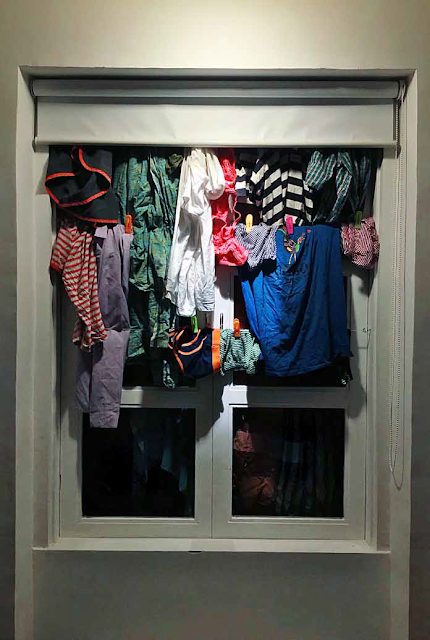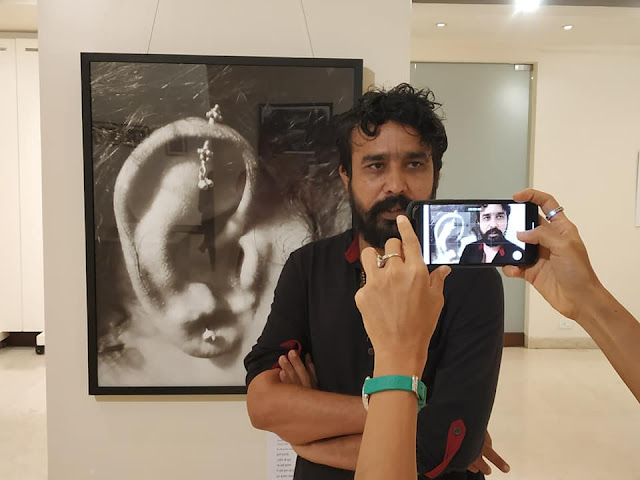Art & Deal Magzine
New Delhi
Priya
Dube (1992) was born to a family belonging to Uttar Pradesh in Sumesherpur. The
family shifted to Bombay, where she was raised. Her journey in the field of the
arts began at an early age when she began to
sketch and draw her immediate surroundings. After she acquired a degree in
interior designing, she worked as
a designer for five years. Eventually, she found her calling as a fine art
practitioner and began her practice from
home.
Dube’s
poetry and art speaks of her life: a life that she chose to rebel against the
institutionalised setups with.
Her works speak of her resistance to the inculcated practices of boundaries
that has over the years
become our identity. In a society of norms that includes language, marital
status, class consciousness, and
occupational constructs, the very act of making art and writing poetry has
become a form of resistance.
Her
art speaks a language of the inculcated systems of womanhood, whereby,
womanhood is her boundary. This
is the boundary she breaks with her installation of clothes lined up against
the windowpane, which she calls
“Your Thoughts Drying Under the Sun, Night will be Sunshine with Hair”. The
installation speaks of
how we hang our minds out to dry, while we mull over our situations on an
everyday basis.
The clothes lined up are a regular middle-class household sight, where lining them up is the easiest and fastest way to find them and arrange them. Her installation shows the convenience associated with her daily life, where she finds herself constantly rummaging through her surroundings for details that accentuate her being. Similarly, the self-portrait is an insight to how she looks at herself. A poem that describes her yearning to be one with what she looks at while looking deep within herself is included as the title and a part of the painting. Her words enunciate her desire and longing that she has buried within herself. This journey is not only spiritual but also political, where she discloses her utmost desire to be seen as a capable being and a desirable one at that. The genitals are so regularly decisive of what or who we should become and how prolifically homogenized is that idea that she creates several images of the vagina to dismount from the stationed notions of gender.Here, she includes a poem that describes the mood of the vagina. Thereby, she brings forth the point of consent and the dilemma of gendered desire. Her other works to speak of her daily interactions with her surroundings and with the core of her existence.
The clothes lined up are a regular middle-class household sight, where lining them up is the easiest and fastest way to find them and arrange them. Her installation shows the convenience associated with her daily life, where she finds herself constantly rummaging through her surroundings for details that accentuate her being. Similarly, the self-portrait is an insight to how she looks at herself. A poem that describes her yearning to be one with what she looks at while looking deep within herself is included as the title and a part of the painting. Her words enunciate her desire and longing that she has buried within herself. This journey is not only spiritual but also political, where she discloses her utmost desire to be seen as a capable being and a desirable one at that. The genitals are so regularly decisive of what or who we should become and how prolifically homogenized is that idea that she creates several images of the vagina to dismount from the stationed notions of gender.Here, she includes a poem that describes the mood of the vagina. Thereby, she brings forth the point of consent and the dilemma of gendered desire. Her other works to speak of her daily interactions with her surroundings and with the core of her existence.
“Love
Box with Smoking Ideas”, a depiction of several images from her everydays, and “Beautiful
Mind”,a
combination of several aestheticized pictures of people, are evocative of
everything that has visually pleasured
and plagued her. Such a range emphasizes her keen ability to look deep within
and outside the peripheries
of the society she struggles with as a woman and as a metropolitan individual.
All
in all, Dube’s works are evocative of our every day, whereby, making it even
more plausible for us to see what
we don’t want to see. Her works enables us to see which we have seen every day
and have functionally desensitised
ourselves towards. Her anguish, her love,her desire, and her ability to mull
over all that she is or
is to become has all been set right in front of our eyes to witness. In doing
so, we are not only witnessing her
journey but the journey of our collective existence.Therefore, Dube’s works
speaks of us all.
Nippon Gallery
30/32, 2nd Floor, Deval Chambers,
Nanabhai Lane, Flora Fountain, Fort, Mumbai - 400 001/ Tel: 022 66333997
Mumbai, Maharashtra
30/32, 2nd Floor, Deval Chambers,
Nanabhai Lane, Flora Fountain, Fort, Mumbai - 400 001/ Tel: 022 66333997
Mumbai, Maharashtra











